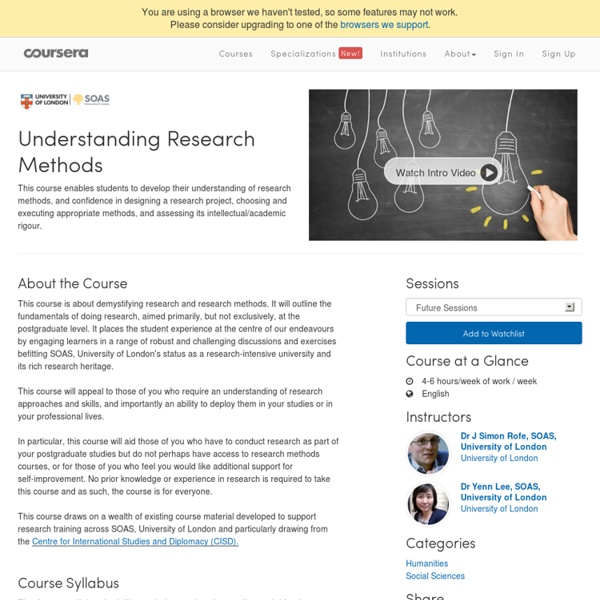Understanding Research Methods

Greek and Roman Mythology
About the Course Myths are traditional stories that have endured over a long time. Some of them have to do with events of great importance, such as the founding of a nation. Others tell the stories of great heroes and heroines and their exploits and courage in the face of adversity. Course Syllabus Week 1: Homer, epic poetry, and Trojan legends Week 2: Heroes and suffering Week 3: This World and other ones Week 4: Identity and signs Week 5: Gods and humans Week 6: Religion and ritual Week 7: Justice Week 8: Unstable selves Week 9: Writing myth in history Week 10: From myths to mythology Recommended Background No special background is needed other than the willingness and ability to synthesize complex texts and theoretical material. In-course Textbooks As a student enrolled in this course, you will have free access to selected chapters and content for the duration of the course. Suggested Readings We will be covering the following in class: Greek Tragedies, Vol. Course Format
Questionnaire Design for Social Surveys
About the Course This online course is called “Questionnaire Design for Social Surveys” and is based on a course created as part of the Joint Program in Survey Methodology and the Michigan Program in Survey Methodology at ISR. The original course - a core course in our MS program - is one of our most popular courses. Why does the course have such broad appeal? But designing questions that get good answers is harder than it looks. The target audiences for this course are students and professionals from all fields of social science that are involved in primary data collection. Course Syllabus Click here to view the course syllabus. Recommended Background Students should have familiarity with use of surveys for conducting substantive research, enough familiarity with statistics to interpret results of empirical studies (an undergraduate course or experience reading these articles). Course Format The class will consist of lecture videos, which average roughly 10 minutes in length.
Animal Behaviour and Welfare
About the Course Animals occupy a huge part of the planet and our lives, and although we rely on them for all aspects of our own wellbeing - food, draught power, medical advances, clothing, sport as well as pleasure, protection and comfort - often their quality of life is questionable. Appreciating how animal's experience the world they live in and the different behavioural needs of the various species we interact with, enables us to gain a better understanding of their welfare requirements, so that long term improvements to animal lives can be made. There are now more than 60 billion land animals raised for meat each year around the world, and with increasing human populations and a rise in meat consumption in many parts of the world, these figures are set to double by 2050. This course is delivered collaboratively by academics from the University of Edinburgh and Scotland's Rural College (SRUC). Verified Certificates: Link Coursework to Your Identity Course Syllabus Recommended Background
Copyright for Educators & Librarians
Will I get a Statement of Accomplishment after completing this class? Yes. Students who successfully complete the class will receive a Statement of Accomplishment signed by the instructor. What resources will I need for this class? For this course, all you need is an Internet connection and the time to read, write, discuss, and think about our topic. Is this course only for Americans? Throughout the class we will be discussing the copyright law of the United States, and applying that law to the examples we discuss. What is the coolest thing I'll learn if I take this class? Our goal is to help you become a copyright maven, and the coolest thing you will get from this class, we hope, is confidence to do your jobs without undue fear about copyright. For example, is it copyright infringement to decorate a library floor with the complete text from published books? Can I get professional credit for this class? You can get a Statement of Accomplishment that will be signed by the instructors.
Google Wants to Pay for Women to Learn How to Code
Since tech companies like Google started releasing their diversity numbers it’s become quickly apparent that those numbers skew heavily towards white male employees. It’s a problem, but one Google acknowledges and wants to fix. They’ve announced a plan to pay for women and minorities to learn to code. The new plan was announced by Google X Vice President Megan Smith as part of Google I/O. Google is joining with Code School for this endeavor and will be offering thousands of free accounts to qualified and interested people. It’s good to see Google working to even things out. (via CNET, image via JD Lasica) Previously in
Related:
Related:



